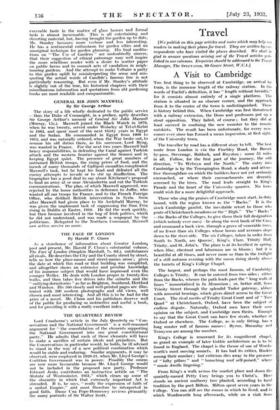GENERAL SIR JOHN MAXWELL By Sir George Arthur
The story of a life wholly dedicated to the public service —thus the Duke of Connaught, in a preface, aptly describes Sir George Arthur's memoir of General Sir John Maxwell iMurray, 15s.). Maxwell joined the Black Watch in 1879, when he was twenty, served under Wolseley at Tel-el-Kebir in 1882, and spent most of the next thirty years in Egypt and the Sudan. He commanded in Egypt from 1908 to 1912, and was naturally ordered, when the War broke out, to resume his old duties there, as his successor, Lord Byng, was wanted in France. For the next two years Maxwell had heavy responsibilities, in defending the Canal against Turkish attack and the western frontier against the Senussi and in keeping Egypt quiet. The presence of great numbers of untrained British troops, the rising prices of food, and the inrush of many thousands of Gallipoli casualties complicated Maxwell's task, but he kept his head. and defeated all the enemy attempts to invade or to stir up disaffection. The biographer has a good deal to say about Kitchener's proposal to land an army at or near Alexandretta and cut the Turkish communications. The plan, of which Maxwell approved, was rejected by the home authorities in deference to Joffre, who wanted all our troops for France, and to the French Foreign Office, who disliked British intervention in Syria. Soon after Maxwell had given place to Sir Archibald Murray, he was given the unpleasant task of suppressing the Sinn Fein rising in Dublin at Easter, 1916. He did the work quickly, but then became involved in the bog of Irish politics, iVhielt he did not understand, and was made a scapegoat by the politicians. Relegated to the Northern Command, Maxwell saw active service no more.














































 Previous page
Previous page